Normal osmolarity - Study guides, Class notes & Summaries
Looking for the best study guides, study notes and summaries about Normal osmolarity? On this page you'll find 1728 study documents about Normal osmolarity.
Page 4 out of 1.728 results
Sort by
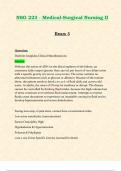
-
NSG223 / NSG 223 Exam 3 (Latest 2024 / 2025 Update): Medical-Surgical Nursing II | Guide Questions and Verified Answers | 100% Correct | Grade A - Herzing
- Exam (elaborations) • 35 pages • 2024
- Available in package deal
-
- $7.99
- + learn more
Exam 3: NSG223 / NSG 223 (Latest 2024 / 2025 Update) Medical-Surgical Nursing II / Med Surg 2 Exam | Guide Questions and Verified Answers | 100% Correct | Grade A - Herzing Q: Diabetes Insipidus Clinical Manifestations Answer: Without the action of ADH on the distal nephron of the kidney, an enormous daily output (greater than 250 mL per hour) of very dilute urine with a specific gravity of 1.001 to 1.005 occurs. The urine contains no abnormal substances such as glucose or albumin. Because of th...
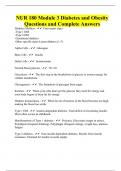
-
NUR 180 Module 3 Diabetes and Obesity Questions and Complete Answers
- Exam (elaborations) • 4 pages • 2023
- Available in package deal
-
- $8.99
- 1x sold
- + learn more
Diabetes Mellitus - Four major types -Type 1 DM -Type 2 DM -Gestational diabetes -Other specific types-Latent diabetes (1.5) Alpha Cells - Glucagon Beta Cells - Insulin Delta Cells - Somatostatin Normal blood glucose - 70-110 Glycolysis - The first step in the breakdown of glucose to extract energy for cellular metabolism. Glycogenesis - The formation of glycogen from sugar. Ketones - When your cells don't get the glucose they need for energy and your bo...
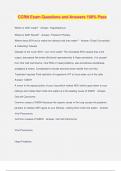
-
CCRN Exam Questions and Answers 100% Pass
- Exam (elaborations) • 53 pages • 2024
- Available in package deal
-
- $13.49
- + learn more
CCRN Exam Questions and Answers 100% Pass Where is ADH made? - Answer- Hypothalamus Where is ADH Stored? - Answer- Posterior Pituitary Where does ADH act to make the kidneys hold onto water? - Answer- Distal Convoluted & Collecting Tubules Disease of too much ADH = too much water! The increased ADH causes less urine output, decreased Na levels (dilutional hyponatremia) & Hypo-osmolarity. It is caused from Oat Cell Carcinioma, Viral PNA or head problems, also sometimes anesthesia, analges...
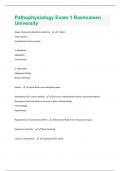
-
Pathophysiology Exam 1 Rasmussen University (Quizzes With Correct Ans) Already Passed!!
- Exam (elaborations) • 28 pages • 2024
- Available in package deal
-
- $7.99
- + learn more
Stages of general adaptation syndrome - 1. Alarm Initial reaction Sympathetic nervous system 2. Resistance Adaptation Limit stressor 3. Exhaustion Adaptation failing Disease develops Edema - Excess fluid in the interstitial space Dehydration (ECF volume deficit) - Can occur independently without electrolyte defects Decrease in fluid level leads to increase in level of blood solutes Cell shrinkage Hypotension Hypovolemia or fluid volume deficit - Decreased fluid in the intravascular...
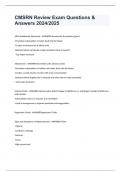
-
CMSRN Review Exam Questions & Answers 2024/2025
- Exam (elaborations) • 8 pages • 2024
- Available in package deal
-
- $8.49
- + learn more
CMSRN Review Exam Questions & Answers 2024/2025 ADH (Antidiuretic Hormone) - ANSWERS-Secreted by the pituitary gland -Promotes reabsorption of water back into the blood -Creates small amounts of dilute urine -Released when osmolarity is high and when there is low ECF -"Tap water hormone" Aldosterone - ANSWERS-Secreted by the adrenal cortex -Promotes reabsorption of sodium and water back into the blood -Creates a small volume of urine with a low concentration -Released when angio...
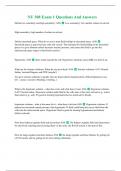
-
NU 308 Exam 1 Questions And Answers
- Exam (elaborations) • 3 pages • 2024
- Available in package deal
-
- $12.49
- + learn more
NU 308 Exam 1 Questions And Answers Define low osmolarity and high osmolarity: ANS Low osmolarity: low number solutes in solvent High osmolarity: high number of solutes in solvent Define interstitial space. What do we use to treat fluid buildup in interstitial space: ANS Interstitial space is space between cells and vessels. The treatment for fluid buildup in the interstitial space is to give albumin (which increases oncotic pressure, and causes the fluid to go into the intravascular sp...
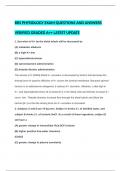
-
BRS PHYSIOLOGY EXAM QUESTIONS AND ANSWERS VERIFIED GRADED A++ LATEST UPDATE
- Exam (elaborations) • 17 pages • 2024
- Available in package deal
-
- $9.99
- + learn more
BRS PHYSIOLOGY EXAM QUESTIONS AND ANSWERS VERIFIED GRADED A++ LATEST UPDATE 1. Secretion of K+ by the distal tubule will be decreased by (A) metabolic alkalosis (B) a high-K+ diet (C) hyperaldosteronism (D) spironolactone administration (E) thiazide diuretic administration The answer is D [VB4b].Distal K+ secretion is decreased by factors that decrease the driving force for passive diffusion of K+ across the luminal membrane. Because spirono- lactone is an aldosterone antagonist, it reduc...
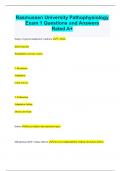
-
Rasmussen University Pathophysiology Exam 1 Questions and Answers Rated A+
- Exam (elaborations) • 47 pages • 2024
- Available in package deal
-
- $11.99
- + learn more
Rasmussen University Pathophysiology Exam 1 Questions and Answers Rated A+ Stages of general adaptation syndrome 1. Alarm Initial reaction Sympathetic nervous system 2. Resistance Adaptation Limit stressor 3. Exhaustion Adaptation failing Disease develops Edema Excess fluid in the interstitial space Dehydration (ECF volume deficit) Can occur independently without electrolyte defects Decrease in fluid level leads to increase in level of blood solutes Cell shrinkage ...

-
TEST BANK FOR GUYTON AND HALL TEXTBOOK OF MEDICAL PHYSIOLOGY BY HALL 12TH EDITION
- Exam (elaborations) • 297 pages • 2023
-
- $20.00
- 1x sold
- + learn more
TABLE OF CONTENTS I. Introduction to physiology: the cell and general physiology. 1. Functional organization of the human body and control of the 'internal environment; 2. The cell and its functions; 3. Genetic control of protein synthesis, cell function, and cell reproduction II. Membrane physiology, nerve, and muscle. 4. The DNA code in the cell nucleus is transferred to an RNA code in the cell cytoplasm the process of transcription; 5. Membrane potentials and action potentials; 6. C...
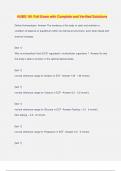
-
HUBS 191 Full Exam with Complete and Verified Solutions
- Exam (elaborations) • 22 pages • 2024
- Available in package deal
-
- $12.49
- + learn more
HUBS 191 Full Exam with Complete and Verified Solutions Define Homeostasis -Answer-The tendency of the body to seek and maintain a condition of balance or equilibrium within its internal environment, even when faced with external changes [lect 1] Why is extracellular fluid (ECF) regulated in multicellular organisms ? -Answer-So that the body is able to function in the optimal desired state. [lect 1] normal reference range for Sodium in ECF -Answer-135 - 145 mmol/L [lect 1] normal refer...

How did he do that? By selling his study resources on Stuvia. Try it yourself! Discover all about earning on Stuvia


